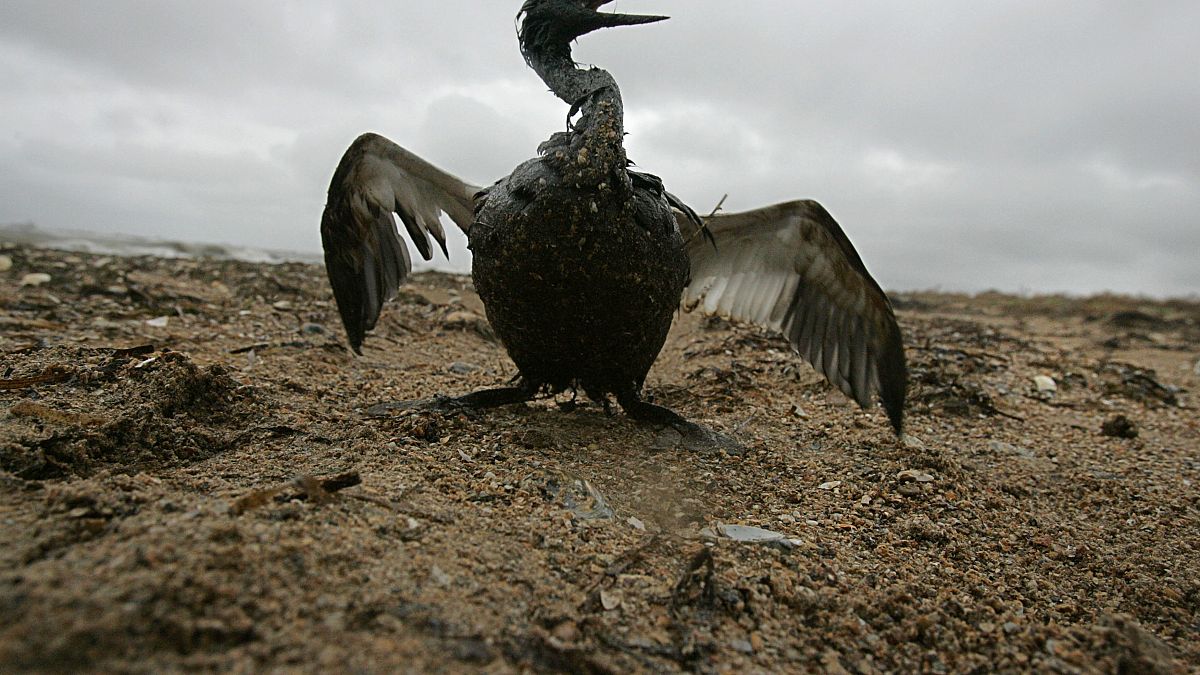Devastating Oil Spill Strikes Black Sea, Sparking Environmental Emergency
2024-12-17 23:05:08
Instructions

Recent footage has unveiled the alarming sight of oil-streaked shores and birds coated in a thick layer of mazut. In light of this environmental disaster, officials have announced that clean-up efforts are currently in progress. However, the full extent of the environmental impact remains uncertain, raising concerns among local communities and environmentalists alike.
Environmental Crisis: The Unseen Impact of Oil Pollution
Recent footage revealing shores tainted by oil and wildlife suffering due to mazut has raised alarms amongst officials and environmentalists alike. As clean-up operations commence, questions linger about the profound and potentially irreversible consequences for the local ecosystem.In the Wake of Disaster: A Call to Action for Environmental Protection
The Devastating Aftermath of Oil Pollution
Images of wildlife struggling within slicks of oil present a stark reminder of the ongoing environmental crises our planet faces. The recent incident, which has left coastlines stained and local fauna compromised, underscores the fragility of our natural habitats. As oil seeps into the crevices of the shore, it not only disrupts delicate ecosystems but also poses long-term threats to marine life. Species that rely on those environments for feeding and breeding are left vulnerable, and the repercussions of such pollution ripple through the food chain, extending its impact far beyond the initial site of contamination.
Societal responses to these incidents often emerge as clean-up efforts initiated by governmental bodies and non-profit organizations. However, while these actions are necessary, they can sometimes overshadow a crucial aspect of environmentalism: proactive prevention. Merely responding to oil spills isn't enough; communities must adopt robust strategies that reduce the likelihood of such incidents occurring in the first place. This includes lobbying for stricter regulations on oil drilling, better management of waste, and investing in sustainable practices that prioritize ecological health over profit.
The Uncertain Future: Assessing Environmental Impacts
As officials embark on extensive clean-up efforts, the longer-term environmental impacts remain a cause for concern. Scientists continue to study how oil spills affect local ecosystems over time, revealing that even after immediate clean-up, the consequences can linger for years. Toxins from oil can penetrate deep into soil and water systems, affecting not only wildlife but also vegetation. In some cases, even seemingly recovered areas show signs of diminished biodiversity, indicating underlying damage that may not be immediately visible to the naked eye.
Moreover, the psychological effects on communities that depend on these natural resources cannot be ignored. Fishermen and local businesses face uncertainty, grappling with potential long-term declines in their livelihoods as fish populations dwindle or as consumers shy away from contaminated waters. The story of oil spills transcends the immediate physical environment; it intricately weaves through the fabric of community, culture, and economic viability, illustrating the vast interconnectedness of our actions and the health of our planet.
The Role of Community and Advocacy
In times of environmental crisis, grassroots organizations and community advocates often play pivotal roles in driving awareness and action. Mobilizing local citizens to participate in clean-up efforts, host educational workshops, or rally for policy changes can empower communities to reclaim their environment. When people come together for a common cause, the collective strength can result in significant advocacy for enhanced environmental rights and protections.
Additionally, fostering a sense of stewardship for the environment begins at the grassroots level. Schools, community centers, and local governments can collaborate to educate citizens about the importance of maintaining healthy ecosystems, encouraging sustainable practices that prevent pollution at its source. This shift from reactionary measures to proactive environmental stewardship is essential in ensuring a healthier planet for future generations.
The Power of Legislation and Policy Reform
At the same time, the battle against oil pollution cannot rely solely on community actions; legislative reform is paramount to curtailing further ecological disasters. Stricter laws governing oil drilling, transportation, and spill response can create a framework that holds corporations accountable for their ecological footprints. Policymakers must align economic incentives with ecological sustainability, ensuring that those who profit from natural resources commit to protecting them.
Advocating for stronger environmental laws involves not just local actors but participants at all levels of governance. Engaging with representatives, attending public hearings, and lobbying for change are ways individuals can influence policy decisions. The intersection of community action and legislative reform offers a dual approach to tackling environmental degradation, creating a more comprehensive solution that balances ecological integrity with economic interests.
Educational Outreach: A Path Towards Change
Education plays a crucial role in shaping public perceptions and fostering a culture of sustainability. By raising awareness about the impacts of oil spills and other forms of pollution, communities can inspire more individuals to take action. Setting up community workshops, organizing clean-up outings, or even utilizing social media campaigns can galvanize collective efforts to promote positive environmental behavior.
Moreover, it’s vital to incorporate environmental education into school curricula at all levels. Encouraging students to explore and understand their impact on the environment from a young age can cultivate a generation committed to conservation. By garnering support from educators, parents, and local leaders, communities can create a ripple effect of ecological mindfulness that transcends individual actions, leading to collective change.
